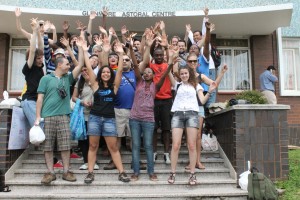Youth hold key to green economy
November 29, 2011 in Ecological Justice
By Maggie Mwape- Zambia
The concept of the green economy has gained momentum in large extent since it provides response to multiple crises facing the world in recent years such as – climate issues, food and economic crisis. Green economy promises an alternative growth paradigm to protect earth ecosystem and alleviate poverty. Transition to a green economy means moving away from the system that encourages such crisis to one that proactively addresses and prevents them.
Failure to tackle poverty leads to increased social tensions, ecological
pressures, economic crisis which emphasize on the urgency to transit to a “green economy”. Such economy fosters sustainable development and poverty eradication. The sad truth is, Zambia for instance has failed to eradicate poverty in the 21st century which has seen development growth.
For the world or Africa and in my case Zambia to realize economic growth protection of environment is a must as priority is given to the youth. It is equally important to highlight the social dimension to pursue a green economy. No doubt the poor are most vulnerable to environmental degradation. In order to raise living standards in a manner that improves health and general well-being of the society, the green economy should be a consideration. That should also emphasize usage of our resources in a more sustainable manner.
In my opinion, i view the green economy to even cover broader sets of issues such as improved resource efficiency and production practice in the use of energy, water management, materials, and natural resources. To maintain an ecosystem service that forms foundation for green growth we must develop and deploy clean energy technologies, improve consumer outreach efforts that promote green purchase. In addition to develop human capacity for the green economy that supports efforts to eliminate fossil fuel subsidies and trade barriers on environmentally friendly goods and services.
Green growth is often hampered by market failures and it is facilitated by three key policies that aim to get the prices and quantities right, investment in innovative technology to research and development as well as responsibly manage public shared resources. If implemented appropriately, these policies promises strong economic growth and improve environmental quality, health and well-being.
It is a fact that no government can independently lead the transition to a green economy in isolation. This calls upon climate change players to engage the youth and private sector to leverage investments to promote green business practices. Inclusion of all stakeholders in the process of transition will fast track the realization of a green economy.
Credit ought to be given to largest companies driving global change in green practices in their supply and production chains. In same light, areas where market signals are not effective, governments should look for ways to collectively engage with private sector to encourage involvement.
Any success in green economy should not ignore the role played by youths and women in activating society change. Opportunity waits in this group on education, technical training, and access to finance land and resource rights which can propel quick realization of green economy.
Investment in human capital is essential for a green economy. For Zambia focus should be directed on improved science education, technology, engineering and mathematics skills that support green economic growth. Shift in labour is a feature for any economy to transit into a green economy. Nevertheless such transition should promote job creation and train workforce in skills required to succeed in achieving a green economy.
As a young person, i urge the Zambia government, United Nations, International Donors and Private sectors to announce an innovative policy that aims to promote research and development. Such efforts improve access to finance youth entrepreneurs and reduce barriers to new businesses and backlogs patents. International cooperation has a role to play leverage complementary strengths and share the cost of public investment in innovation. All countries have a shared responsibility to create clean energy technology markets by providing enabling policy environments.
The green economy is not a one-size-fits-all proposition. Each nation need to define own priorities and processes that suit and meet own interest(s). Presentation of a toolkit, range policy options collectively recognized and accepted may be the path to a green economy.


